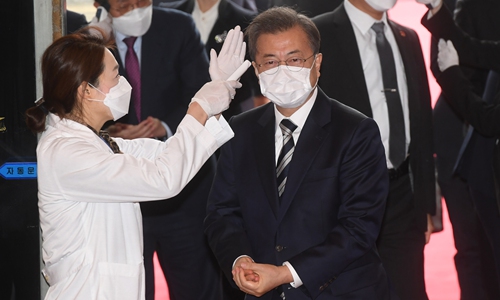Petition exposes network of blackmailed underaged girls
South Korean President Moon Jae-in called on Monday for a full investigation into a network of chat rooms at the heart of an operation to blackmail women and underage girls into sharing sexual images of themselves.

South Korean President Moon Jae-in (right) has his body temperature checked as he arrives at the National Assembly in Seoul on Friday. Photo: AFP
The National Police Agency told reporters that 124 suspects had been arrested and 18 operators of chat rooms on Telegram and other social media had been detained as a result of investigations into such sexual crimes since September 2019.
The perpetrators would attract victims through fake job ads and solicit compromising photographs. They would then threaten to release the photographs if the victims did not send images of increasingly degrading and violent acts, the police said.
At least 74 women, including 16 underage girls, were "virtually enslaved" for several months, police said. In some cases, the victims were blackmailed into committing violent acts on themselves.
Public outrage hit critical mass on Monday as a petition gathered over 2.3 million signatures - passing a threshold that requires the president's office to respond.
The author of the petition urged the authorities to disclose the identity and the face of the man, who allegedly lured victims into taking nude images of themselves and shared them on a chat room on Telegram, a popular encrypted messaging app. The petition also criticized other participants who paid as much as 1.5 million won ($1,187.32) to view the images.
Police said as a matter of policy they would not reveal the name of the man believed to be at the center of the network, who went by the username "GodGod."
The presidential Blue House spokesman Kang Min-seok told reporters that Moon considered the alleged crimes to be "a cruel act that destroyed human life" and that he had asked police to treat the case as a serious crime.
On the background of the president's statement, a Cheong Wa Dae official later told reporters that Moon wants to change the "wrong perception" of criminals that they won't be caught if they hide "in anonymity." Moon, a former human rights lawyer, regards the case as reflecting a problem linked with the social safety and basic human rights of all South Koreans, not only women, the official said.
As digital sex crimes rise worldwide, South Korea has also become the global epicenter of spycam pornography - the use of tiny, hidden cameras to film victims naked, urinating or mid-sex.
In late 2019, South Korean, British and US authorities said they had arrested 337 people worldwide, including 223 South Koreans, after knocking out a child pornography website operated from South Korea.
The Women's Party, South Korea's first feminist party has vowed on March 8 to push for equal pay and tougher laws to end widespread voyeurism against women as it gears up to contest an upcoming election.
It has signed up over 8,000 members, founded as a growing feminism movement has started to emerge in the socially conservative Asian country.
The feminist party hopes to win four of 300 parliamentary seats up for grabs in an April 15 poll although political analysts said it would be a challenge for the fledgling party.
Targeting young women, Kim Eun-ju, a veteran women's rights activist and one of the party's founders, said the party would lobby for stronger laws to curb "spycam porn" or the epidemic of voyeurism, which laid the foundation for a feminism movement.
Newspaper headline: Moon calls for sex crimes probe